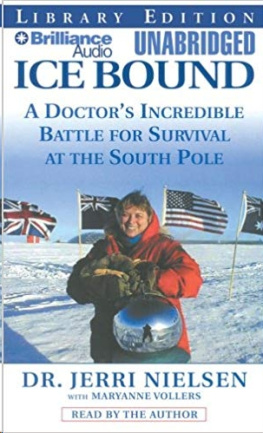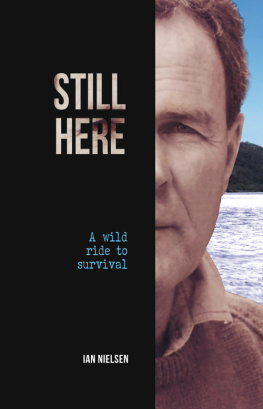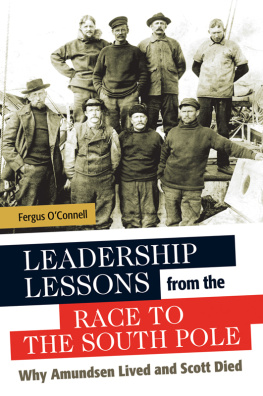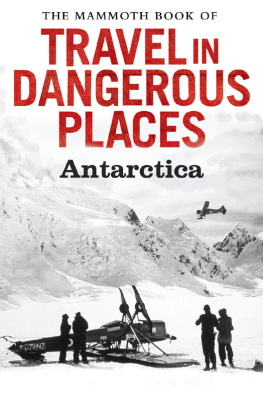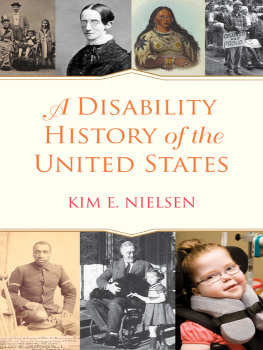CHAPTER I:
The Geographic Cure
If this story is to begin anywhere, it should begin in the night. I have always been a night person. When the sun goes down, my spirits rise. Im more alert, quicker, more in tune with the rhythms of the world. There are many nights to choose from, but one comes to mind now, in the emergency room at a hospital in Cleveland, Ohio, two months before I went to the Ice:
For me, each shift started before I reached the hospital gates. I drove into the city like a soldier preparing for battle, chugging coffee and listening to rock tapes to shake my brain awake and get my blood pumping. Dangerous Minds. Queen. We will, we will rock you! As I passed the ambulances and police cruisers parked at the back entrance, I felt an enormous energy and dread. The automatic doors slid open with a sucking sound, and I was pulled into the ER like a swimmer in a riptide.
Oh dear God, let everything go right tonight. I navigated my way through anxious families huddled in the hallway, past the rows of injured people immobilized on backboards, the sick on stretchers, some crying out for help. By now, I was on. Its show time! I had to be composed, acutely aware, and ready to think on my feet, no matter how little sleep Id had the day before, what had happened at home before leaving for work, how I felt.
As I walked into the nurses station, I arrived in the safe zone of emergency medical technicians, nurses, x-ray techs, and lab techs. My physician partners looked stressed and hurried as they usually did at this time of night, prime time for emergency medicine.
Nielsen, really good to see you! said Max, a friend and fellow ER doc as he raced toward a trauma room. Grab some charts, we just took a big hit.
No time to get a cup of coffee or converse, there were eight charts in the rack, representing patients ready to be seen. An emergency room in a big American city is a crucible of human suffering and desperate behavior. Everybody and everything rolls in off the streets at one time or another, and anything can happen. The walk-in case might have the flu or viral meningitis, the man on the stretcher might have a bruised shoulder or a bullet in the heart. Many of our late-night visitors were gang members and crack addicts. I never knew what to expect when I pulled back the curtain: Once, when I was pregnant, a man pulled a knife while I cut off his leather jacket with trauma scissors.
I was only saved by a savvy ER nurse, a former medic with two tours in Vietnam. He saw the knife coming toward my ribs and threw me out of the way into a wall before I knew what was happening.
I should say here that I am only five foot three, but nobody has ever thought of me as small. It was a lesson I always taught my female interns: Doctors are not short. Doctors have no gender. Doctors are in controlor at least you have to seem that way as a patients world spins into chaos. Through it all you have to wear a face that shows no judgment, no revulsiononly empathy and calm. After a while it becomes second nature.
This night, the first few cases were routine. I talked with them, examined them, and dispositioned them, deciding if they went to intensive care, critical care, surgery, or home. The stroke victim would go to the ICU, the child with abdominal pain was sent directly to surgery for an appendectomy, the man with a fractured ankle was splinted and then released home in the care of an orthopedist. There were multiple heart attacks, overdoses, and a cancer patient with acute pneumonia. A woman walked into the waiting room with two black eyes and a gash on her forehead that clearly needed stitches. She told the triage nurse that she had fallen down. After treating her wounds, I referred her to a domestic violence counselor.
Before long, I had twenty cases in my headin orbit, as we say.
It was what I was trained to do, and I settled into the nights tempo.
Still, it seemed there was never enough time to spend with patients.
The object of a commercial ER is to move people through as quickly as possible, to meet and street them without compromising care.
Sometimes we all felt like hamsters spinning in our wheels.
At 2 a.m. we got a call on the radio that a gunshot wound was coming in by ambulance. I made my way to the EMTs break room and downed three packs of crackers and a cup of black coffee. I was pulling on my gown, mask, foot protectors, and goggles when a second call came over the box:
Three minutes out. Twenty-three-year-old male, gunshot wound to the head.
The other members of the trauma team left their workstations and descended on the empty cart in our biggest room. Everyone had a job to do and everyone knew how to do it and how to function together as a team. This was what I loved about emergency medicine, how everyone worked so well in unison. Nurses laid out sterile packs and hung IV bags. The trauma clock was set. Heat lamps were turned on above our heads.
I rushed to the ambulance entrance. This gave me precious minutes to get information as the patient was being wheeled in. What do you have? I asked the paramedic.
Twenty-three-year-old male, self-inflicted GSW to the head, left frontal, twenty minutes down. Vitals: pulse one fifty, BP ninety over fifty, resp twenty-two, intubated. I glanced at the patient and at the cardiac monitor on the stretcher. His heart was racing. The rundown was repeated to the trauma team as we transferred the patient to our bed. The bullet had entered his left temple at close range; the wound was ringed with black specks of gunpowder and it was pumping blood.
We stopped the external bleeding with pressure and a few sutures. He was hyperventilated on a respirator to decrease intracranial pressure.
We could find no other injuries but we left the cervical collar on until his spine could be x-rayed. He was quickly stabilized and sent to CAT scan with the neurosurgeon. Now it was time to talk to his family.
This was always the hardest part. I preferred to have the family at the bedside, if they wished, during serious cases like this. Not knowing and forever wondering if something else could be done is so much worse for a loving family than being present while decisions were being made. They would know how the team fought for the life, how well we did our job, how hopeless or hopeful the situation was. But in this case, the family arrived too late to be with me in the trauma room.
The look on your face and the way you walk in prepares them for the news. As I sat down and introduced myself, I kept the look of disbelief that I felt, to see a young man in his prime try to take his own life. I often say that you cant be a good ER doc until youve had a stare-down with the devil and lost. The job puts you in the position of sharing peoples darkest hours, their greatest fears and terrible shames.
Its bad, I said, letting it sink in, allowing them see it in my eyes. He is still alive but I dont know if he will survive, and if he does, how the rest of his life will be. Pause. Do you want to see him now?
Just then a nurse walked in and whispered, Doc, youd better come to Room Four, stat. I nodded and stood up. I told the family I was needed to attend another emergency, but assured them that the neurosurgeon would do everything she could and would be able to answer their questions. They could speak to me again if they wanted.
But I knew the man would go to surgery and I would never know his story, probably never know his fate.
The charts were piling up again at the nurses station, and the show still had to go on.
The sun was coming up over the farms and rolling fields of eastern Ohio as I drove home from the hospital. Homewhat a concept. I was forty-six years old and living in my parents house, sleeping in a bedroom decorated with the ruffled curtains and daisy wallpaper of my teenage years. I parked the Volvo in the gravel drive and breathed deeply to banish the lingering smell of blood and disinfectant from my lungs. The autumn air was already touched with winter. The leaves in the canopy of maples and beech trees over the driveway were just starting to turn.

